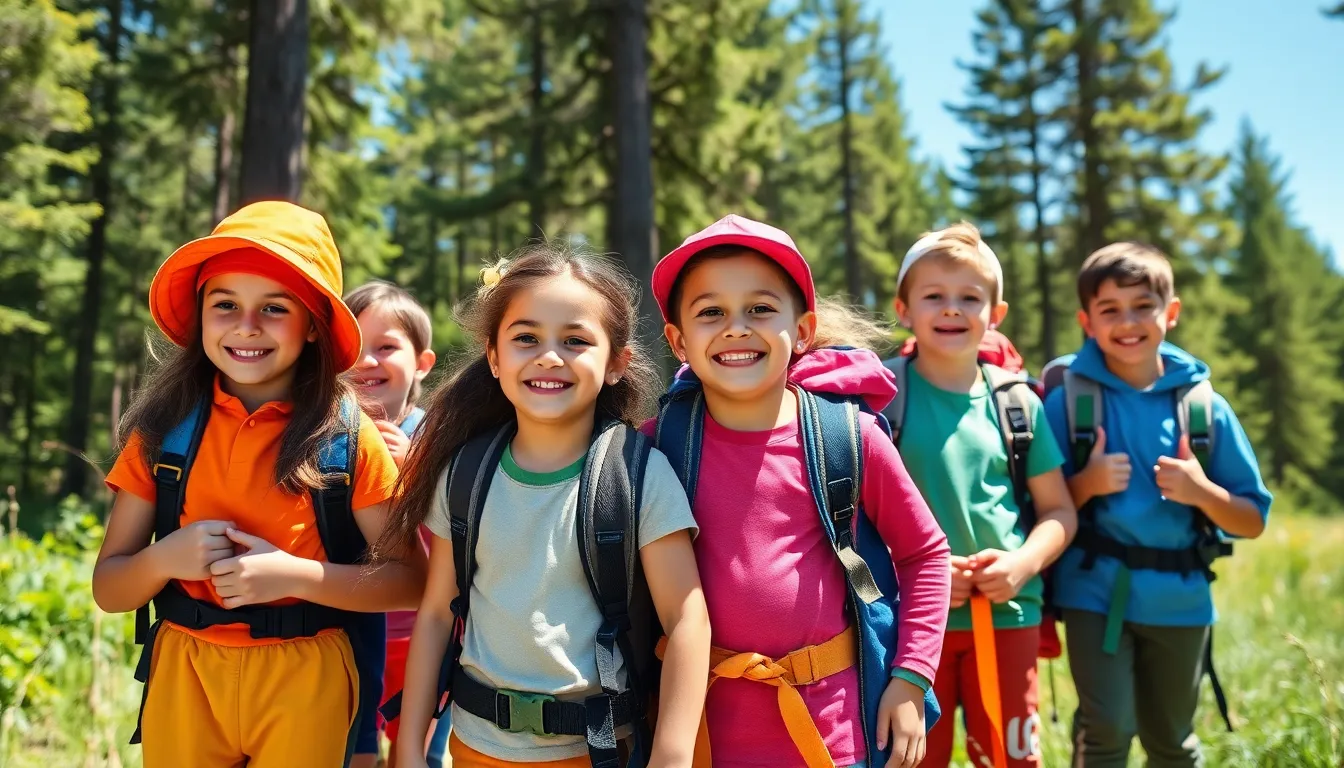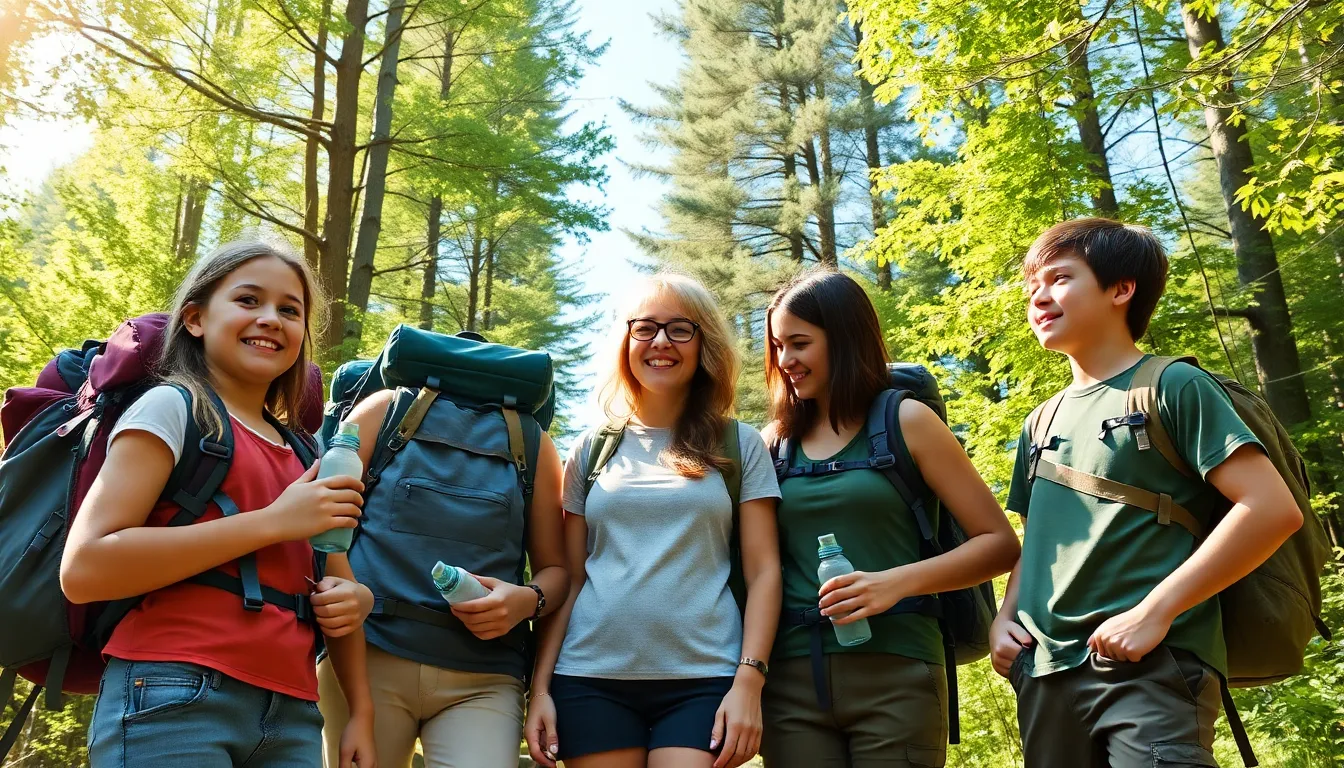Nature camps offer a unique escape into the great outdoors, blending adventure with education. They provide participants of all ages the chance to connect with nature while learning essential skills like survival techniques, wildlife identification, and environmental stewardship. As people increasingly seek ways to unplug from technology, these camps present a refreshing alternative to traditional vacations.
From hiking through lush forests to stargazing under clear night skies, nature camps foster a deep appreciation for the environment. They encourage teamwork and personal growth, making them perfect for families, friends, or solo adventurers. Whether it’s a weekend getaway or an extended retreat, nature camps inspire unforgettable experiences that leave lasting memories.
Table of Contents
ToggleOverview of Nature Camps
Nature camps provide immersive experiences that foster a connection with the outdoors. Designed for participants of all ages, these camps blend essential skills with adventure, creating a unique educational environment.
Activities at nature camps focus on personal growth and teamwork. Campers participate in hiking, stargazing, and wildlife identification, enabling them to develop both physical and cognitive skills. Structured lessons on survival techniques enhance participants’ abilities to navigate and appreciate natural surroundings.
As technology use increases, nature camps present a compelling alternative to conventional vacations. Many choose these camps to unplug and engage with nature, promoting mental well-being. Additionally, the social environments of nature camps allow for building strong relationships among campers, whether they attend solo or with groups.
Overall, nature camps offer unforgettable experiences that enrich participants’ lives through education and adventure.
Benefits of Attending Nature Camps

Nature camps offer numerous benefits that enhance both physical and mental well-being. Participants enjoy a unique blend of education and adventure, promoting overall health and personal growth.
Physical Health Benefits
Nature camps encourage a wide range of physical activities, improving cardiovascular health and increasing endurance. Hiking, swimming, and outdoor sports engage various muscle groups, contributing to overall fitness. Participants often notice weight management improvements along with enhanced strength and flexibility. Exposure to fresh air and sunlight supports vitamin D synthesis, essential for bone health. Moreover, nature’s calming effects contribute to reduced stress levels, promoting better physical health.
Mental Health Benefits
Nature camps foster significant mental health advantages through immersive outdoor experiences. Interacting with nature decreases anxiety and boosts mood by lowering cortisol levels. Engaging in group activities nurtures social interactions, strengthening relationships and combating feelings of loneliness. Learning new skills, such as survival techniques, enhances self-esteem, instilling a sense of accomplishment. Participants report increased focus and creativity due to reduced distractions and enhanced connection with the environment. Overall, nature camps create a holistic approach to mental well-being, fostering resilience and personal growth.
Types of Nature Camps
Nature camps offer various experiences tailored to different interests and preferences. Understanding the types available helps participants choose the one that best suits their needs.
Day Camps
Day camps provide full-day programs where participants engage in outdoor activities without overnight stays. Campers enjoy structured schedules filled with hiking, crafts, and nature exploration. These camps cater to various age groups, promoting socialization and skill development, all while allowing participants to return home each evening. Many day camps also incorporate educational components, teaching campers about local ecosystems and conservation efforts.
Overnight Camps
Overnight camps immerse participants in multi-day experiences, allowing them to connect deeply with nature. Campers live at the camp for several days, fostering camaraderie and independence. Activities may include hiking, swimming, and group challenges, often emphasizing teamwork and leadership skills. Overnight camps often explore specialized themes, such as wilderness survival or environmental stewardship, offering structured programs designed to enhance both education and adventure.
Family Nature Camps
Family nature camps create opportunities for families to bond while enjoying the outdoors together. These camps cater to all ages, providing a wide range of activities that appeal to both children and adults. Families may participate in guided hikes, educational workshops, and collaborative projects, allowing for memorable shared experiences. Family nature camps emphasize creativity, teamwork, and communication, making them ideal for building stronger family connections while enjoying nature.
Popular Locations for Nature Camps
Nature camps thrive in diverse locations that immerse participants in the beauty of the outdoors. Here are some popular types of locations where these camps arise.
National Parks
National parks provide breathtaking scenery and abundant wildlife, making them ideal for nature camps. Locations such as Yellowstone National Park in Wyoming, Yosemite National Park in California, and the Great Smoky Mountains National Park straddle multiple states. These parks enable activities like hiking, wildlife watching, and educational programs that emphasize conservation. Each national park offers unique ecosystems and trails, ensuring varied experiences that enhance nature education.
Wildlife Reserves
Wildlife reserves create immersive environments that promote ecological education through hands-on experiences. Reserves like the Everglades National Park in Florida and the Big Cypress National Preserve focus on protecting native species while offering camps that highlight biodiversity. Participants engage in activities such as birdwatching, guided nature walks, and wildlife tracking, learning the importance of conservation efforts firsthand. The interactive learning at wildlife reserves cultivates a sense of responsibility towards preserving natural habitats.
Private Campgrounds
Private campgrounds offer customizable nature camp experiences and access to amenities like cabins and communal spaces. Locations such as Bluebell Campground in California and White Lake State Park in New Hampshire provide activities ranging from swimming to canoeing. These campgrounds often host thematic programs tailored to specific interests, including photography and outdoor survival skills. The flexibility of private campgrounds allows families or groups to tailor their nature experiences based on their preferences and needs.
Activities Offered at Nature Camps
Nature camps provide a wide range of activities that engage participants and enhance their connection with the outdoors. These activities foster learning, teamwork, and creativity, enriching the overall camp experience.
Hiking and Nature Walks
Hiking and nature walks form a core element of nature camps. Campers explore various trails, learning about local ecosystems and geology. Guided hikes highlight the importance of conservation, encouraging participants to appreciate nature’s beauty while promoting physical fitness. Campers often participate in themed walks, such as bird-watching or plant identification, which deepen their understanding of biodiversity.
Wildlife Observation
Wildlife observation offers campers unique opportunities to observe animals in their natural habitats. Camps arrange guided sessions led by experienced naturalists who share insights into animal behavior and conservation. Participants may use binoculars and field guides, enhancing their skills in wildlife identification. Educational sessions on local species foster respect for wildlife and underscore the importance of protecting ecosystems.
Arts and Crafts
Arts and crafts at nature camps encourage creativity and self-expression. Participants engage in projects that reflect their natural surroundings, such as making leaf rubbings or creating nature-inspired paintings. Camps often provide sustainable materials, teaching campers about recycling and environmental stewardship. These activities not only promote creativity but also strengthen social bonds among campers as they collaborate on group projects.
Nature camps stand out as transformative experiences that blend adventure with education. They not only provide a chance to disconnect from the digital world but also encourage personal growth and mental well-being. By immersing participants in diverse natural settings, these camps foster connections with the environment and with each other.
Whether it’s through hiking, wildlife observation, or creative arts, nature camps offer a wealth of activities that promote physical fitness and social interaction. The memories created in these settings often last a lifetime, making nature camps an ideal choice for anyone seeking adventure, learning, and a deeper appreciation for the great outdoors.




